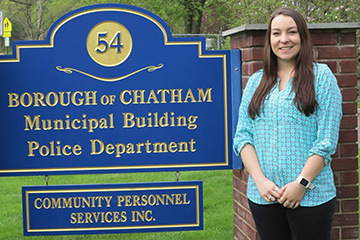Criminal Justice
Contact Information
Criminal Justice
Professor Kathleen Marino, M.S., M.B.A., Ph.D.
Department Chair
Annunciation Center 312
Phone: (973) 290-4324
kmarino@steu.edu
Professor William Schievella
Director, Police Studies Institute
Program Director, Law Enforcement and Public Safety Accelerated Degree Program
Annunciation Center 313
Phone: (973) 290-4085
wschievella@steu.edu
Why Study Criminal Justice at SEU?
"The days of not having a college degree and successfully getting into law enforcement
are over," explains William Schievella, a criminal justice professor at SEU. Listen
to why Bill believes studying at SEU is the perfect place for students.
The Criminal Justice Program provides students with the scholarship and skills necessary
to be proficient and successful in all aspects of the criminal justice system. The
program also provides a solid foundation on which to continue your education in graduate
school.
Since SEU's criminal justice faculty is comprised entirely of practitioners that are
either currently working in law enforcement agencies or have retired from those agencies,
they provide students will field insights, opportunities for networking and access
to internships. Due to the relationships SEU students form with their professors,
they are able to utilize these connections to spend time with active law enforcement
officers, experience community policing, engage in outreach and speak with lawyers.
Key Elements
- Taught by either active or retired law enforcement officers
- Professional networking opportunities
- Access to internships
- Designed to accommodate both entry level students and experienced law enforcement officers
- SEU is home to the The Police Studies Institute which serves as regions law enforcement, public safety and justice “think tank” for development of best practices and policy.
What can I do with this degree?
Students graduating with a degree in criminal justice are equipped with the ability and the capacity to succeed in all aspects of the criminal justice system. Students are prepared for advanced educational pursuits in graduate and professional institutions. Graduates of the Criminal Justice Program work in a variety of fields.
These include:
- All levels of law enforcement
- Business security
- Corrections
- Courts
- Parole/Probation
- Victim and child advocacy
What internship opportunities are available?
 While students have interned at municipal local police departments, they have also
found internships with social service agencies, probation services, the superior courts
and the prosecutor's office.
While students have interned at municipal local police departments, they have also
found internships with social service agencies, probation services, the superior courts
and the prosecutor's office.
A double major in criminal justice and psychology, Tesla Egan completed a paid internship
at Chatham Borough, Department of Community Services. She spent her time writing grants,
organizing events and learning how to improve the quality of life for all residents.
She credits her SEU professors with directing and guiding her toward this opportunity.
"Every professor that I have encountered here has been a great supporter and made
me a better version of myself," says Tesla.



